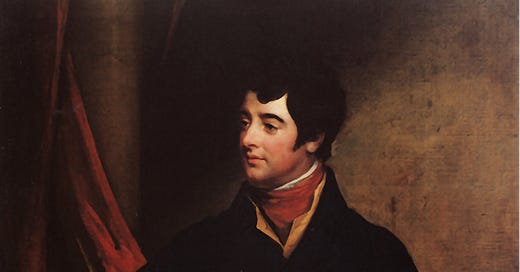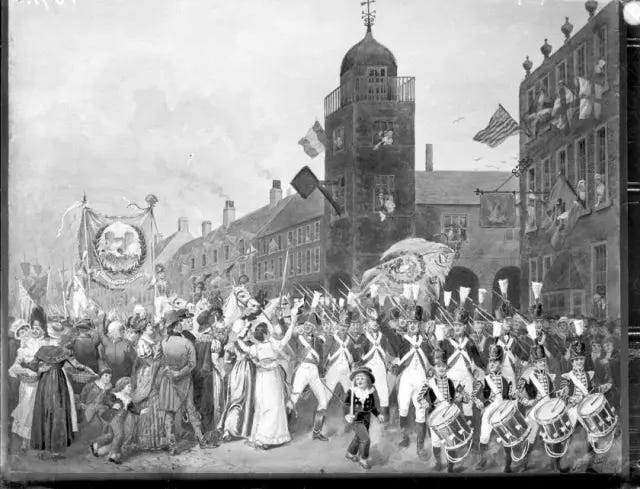The rebellion of 1798 is one of the most significant events of Irish history. It marks the culmination of the long eighteenth century in Ireland – one of ascendant Protestantism, Catholic penal laws and dramatic revolutionary zeal from the 1780s, right up to 1798. It ushered in the era of Westminster rule under the Union of Great Britain and Ireland. The Act of Union settled the question of a local government in Dublin for over a century, ending only at the hands of another violent uprising in 1919.
The men and women who led the charge of 1798 were of a generation, heavily influenced by the American Revolution – young idealists who sought to bring about change in their nation by any means available to them. It is important to ascertain the foundations of their philosophies and for some, we have detailed accounts of their formative experiences. One such example is Lord Edward Fitzgerald, the rebel aristocrat from one of Irelands most powerful and influential families.
As Fitzgerald’s daughter Pamela would later profess, ‘my father had got his republican ideas in America’ – a place he visited twice in his life. First at the young age of 18 as an officer in the British Army, station in South Carolina fighting in the American Wars. He would later return to the military in the late 1780s to be stationed with a command in Fredericton, New Brunswick, Canada. It is from here that todays post begins, he set off on an ambitious journey through the American frontier – travelling by foot and canoe from New Brunswick to New Orleans via the Great Lakes and the Mississippi River.
A detailed route can be drawn from Fitzgerald’s letters which paint a relatively accurate picture of his immense journey. Leaving Fredericton, New Brunswick he travelled by snowshoe to Quebec, then moving on to Montreal, then by boat across Lake Ontario to visit the Niagara Falls, to which he describes as simply, indescribable:
‘I am just come from the Falls of Niagara. To describe them is impossible...Homer himself could not in writing’.
From Niagara he set off to Detroit by canoe with a band of Mohawk Indians. When crossing Lake Ontario, he noted that ‘I was as sick as at sea – so you may guess I prefer canoeing’. Ultimately, he preferred his new company, it brought him through many villages of Native Americans, immersing them in their society and culture for days at a time.
From Ontario he travelled to Detroit and then North to Mackinac Island which bridges the gap between Lake Huron and Lake Superior. There is an accompanying map of this trip to make it easier to understand and visualise the sheer scale of this journey. The details surrounding the remainder of his trip south from Mackinac Island to New Orleans is hazy, the most we know is that he followed the Mississippi River as much as possible. In terms of how he reached that point from the Great Lakes is unclear and I have in my map made assumptions as to how he reached it. My assumptions are bolstered by the work of Daniel Gahan who asserts that he likely travelled to Green Bay and made his way to the Mississippi by way of the rivers Fox and Wisconsin.

Perhaps the most fascinating episode of this journey is the relationships he developed with many native American’s along the way. He names but two - Joseph Brant whom he met at Niagara Falls and travelled with by canoe to Detroit. The other was David Hill, Chief of the Six Nations – it is by David Hill that Fitzgerald is formally inducted into the Seneca/Bear Tribe and made one of their chiefs at Mackinac Island. The document for this remained a part of Fitzgerald’s personal papers for the remainder of his life. He viewed the Native American way of life as a perfectly balanced society, free of;
‘fictitious, ridiculous wants…no devilish politics; no fashions, customs, duties or appearances to the world to interfere with ones happiness’.
He became particularly melancholy and rueful when he reached his final destination of New Orleans, where word reached him that the woman he had hoped to court back home, Georgina Lennox, had married earlier in the year. If it were not for his mother and immediate family waiting for him back home, he;
‘really would join the savages…they have all the real happiness of life, without any of those inconveniences, or ridiculous obstacles to it, which custom has introduced among us’.
It is important to note that what we get from Fitzgerald’s letters is a very romanticised view of Native American society however. He was reared in a household familiar with the philosophy of Jean Jacques Rousseau who forwarded the idea of the ‘noble savage’ and of an idealised man of nature. In Fitzgerald’s letter we see a world which he wants to believe is real, where native society is inherently virtuous, giving and innocent compared to the corrupting nature of European societies built upon politicking and mercantilism.
What must be understood is that the likes of Joseph Brant and David Hill were members of two worlds - natives who held high ranking positions in America and were well known back in Britain also. To Fitzgerald this induction appeared an incredible honour and a sign of their virtuous nature, to David Hill it was as much a political move as it was an act of generosity. Banks and Hill could understand the benefits of having an officer in the British army on the side, never mind the nephew of Charles James Fox, the leader of opposition in Westminster Parliament. They were interested in bolstering an alliance with Great Britain to defend their nations land claims against the interests of the newly formed United States. Little did they know that Britain had largely surrendered the rights of these lands to the United States already.
This romanticised view of native society can be seen through Fitzgerald’s lack of interest in discussing natives beyond early entries while in Nova Scotia and the likes of David Hill and Joseph Brant. He likely would have encountered more isolated native communities further on his journey as he passed the Great Lakes and on to the Mississippi - but of these he wrote nothing. Despite saying the ‘wilder it [human nature] is, the more virtuous’ - he seemed reluctant to embrace much of native society beyond Montreal and the Great Lakes, where his dinners with Joseph Brant likely would have been very aristocratic affairs, with African slaves as servants. Fitzgerald perhaps appreciated the idea of being a ‘thorough Indian’ as he himself stated as opposed to actually becoming one in his own right.
Lord Edward Fitzgerald went to America in 1789 already a strong believer of reform and adhering to an enlightenment belief that all men were inherently equal, that companionship and allegiance could be formulated across class, race and ethnic boundaries. He was reared on influential reformist philosophies growing up and shared familial links with Charles James Fox - advocate for the American Revolution, the French Revolution and the abolition of slavery.
His time through the American frontier simply forced him to re-evaluate and reinforce those beliefs. When he returned to Ireland in the early 1790s, he returned to a very different political atmosphere – reform was in the air, France was in revolution, Volunteer regiments in Belfast celebrated Bastille Day on July 14th 1792 in Belfast. Fitzgerald would go on to spend time in Paris at White’s Hotel - an English-speaking enclave in the heart of the city - and become well acquainted with Thomas Paine and many other famous revolutionaries.
Fitzgerald is remembered as one of the most romantic figures of the 1798 rebellion for the place he held as the rebel aristocrat – the Lord who went to Paris and amidst the revolutionary fervour and renounced his titles. With access to his letters, we are presented with an incredible opportunity to delve into the mind of this great historical figure, to understand what and how he came to believe what he did. What stood out to me more than all was his induction into the Bear Tribe – a story that you simply couldn’t make up. Something that on the surface appears bizarre and incredible but has a much more real explanation than at face value.
Further Reading:
Thomas Moore, The life and death of Lord Edward Fitzgerald (London, 1831), https://babel.hathitrust.org/cgi/pt?id=mdp.39015011552695&view=1up&seq=1.
Daniel Gahan, ‘"Journey after My Own Heart": Lord Edward FitzGerald in America, 1788-90’ in New Hibernia Review (2004), pp 85-105.
Stella Tyllard, Citizen Lord: Edward Fitzgerald, 1763-1798 (London, 1997).







Interesting post! I never knew of Fitzgerald's connections with native Americans. A few years ago I read a memoir by the African American civil rights figure Pauli Murray, who noted that her family had a mythology of Irish descent that linked them to an aristocratic Fitzgerald family from Co. Kildare. Murray was sceptical of the story, seeing it as a way by which her family sought to distance themselves from enslavement, though I've wondered since where the myth met the reality.